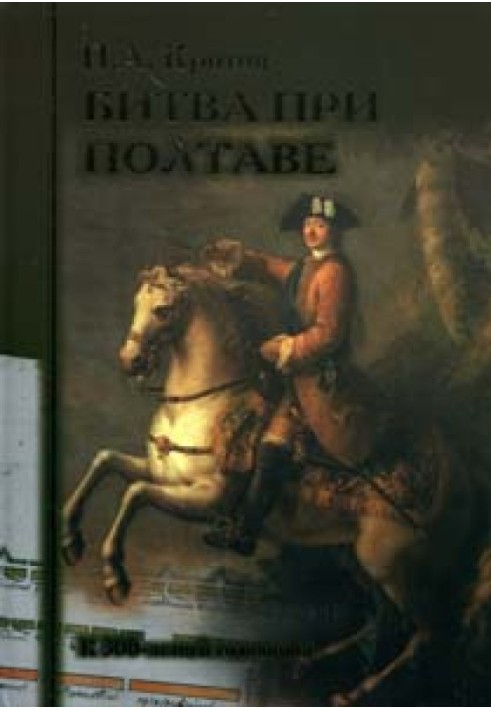Battle of Poltava
 Instant download
Instant download
after payment (24/7)
 Wide range of formats
Wide range of formats
(for all gadgets)
 Full book
Full book
(including for Apple and Android)
The monograph presents the results of the study of the famous battle for more than twenty years by Doctor of Historical Sciences, Professor of the Faculty of History of St. Petersburg State University, Academician of the Academy of Military Historical Sciences P.A. Krotov. The reader will find in the book answers to a wide range of questions related to understanding the figure of Peter the Great as a commander. What is the greatness of the “hero of Poltava”? How did the Transformer become formed in this capacity? What were the personal motives for the first Russian emperor to comprehend the secrets of military leadership? The answers are formulated by the author within the framework of the original concept he put forward, which allows us to look at the military and state activities of Peter the Great from a new perspective. The focus of the study is preparation the Russian monarch of the conditions for victory with little blood, the concept of the battle of the king and his leadership of the course of the battle. The monograph reveals the nature of a large number of historical myths of the Battle of Poltava, which students of Russian schools still study as the reality of the past, and shows the significance of the Battle of Poltava in the history of the Fatherland for the present and future of the Russian state. The book is intended for specialists and anyone interested in Russian history. Table of contents: Instead of a preface. P. 7.On the significance of the Poltava victory. Motives of the military leadership and transformative activities of Peter I. Chapter I. The formation of Peter I as a commander. P. 28. Mastering the ancient and Byzantine experience of military leadership. Peter I's study of the European military experience of the 17th - early 18th centuries. Assistants of Peter I on battlefields. The military style of Charles XII and Field Marshal K.G. Rönschild. Strategic plans of Peter I and Charles XII. Infantry and cavalry combat tactics developed by Peter I against the Swedes. The quality of personnel of the Russian troops. Armament of Russian and Swedish infantry and cavalry, state of artillery. Chapter II. Preparing for the decisive battle. P. 111.Choice of a place for battle and engineering strengthening of occupied positions. Was Peter I preparing an irresistible temptation for the Swedes to use the “golden bridge” to escape? The gathering of Russian troops to the battlefield and their dispersal on the battlefields. Allocation of reserves. What was the garrison of the redoubts like? The number of regular Russian cavalry in the Battle of Poltava. Garrison of the Poltava fortress. Concentration of irregular military formations. The total number of Russian troops in battles. The importance of artillery in battle. "Order de battle" of Peter I. Did Peter I want to attack? The Swedish army before the battle. Chapter III. “And the battle broke out, the Battle of Poltava!” P. 205. The beginning of the battle is the battle at the redoubts. Which troops defeated the detachment of Major General K.G. Ruus? Cavalry reserve of Prince G.S. Volkonsky. Peter I's communication with soldiers and his speech. Tactics of the Russian side at the decisive phase of the battle on the field behind the redoubts. The balance of forces on the battlefield. Continuation of the battle. Why didn't the Russian regular army pursue the Swedes outside the battlefield? Peter I on the battlefield. The price of victory. The price of the defeat of the Swedes. The effectiveness of the actions of the Russian and Swedish armies in the fields near Poltava. Was Peter I a great commander? Assessment of the actions of Charles XII. Epilogue at Perevolochna on June 30, 1709. Chapter IV. P.N. Kryokshin and the creation of myths about the Battle of Poltava. P. 301. The phenomenon of the St. Petersburg writer P.N. Kryokshina: life path, personality and creativity. The writer’s glorification of the deeds of Peter the Great through “noble fiction” and the assimilation of literary mythologies into Russian historiography. Chapter V. Propaganda use of “glorious Victoria”. P. 345. Celebrations of 1709. Monumental propaganda. Celebrating the anniversaries of the victory. Conclusion. P. 380. Applications. P. 386. Index of names. P. 398. Index of geographical names. P. 406. List of abbreviations. P. 411.
Data sheet
- Name of the Author
- Павел Кротов Александрович
- Language
- Russian













